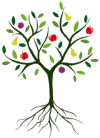Keswick Codlin
Keswick Codlin is a traditional English culinary apple, especially popular in Victorian times as one of the first cooking apples of the season. It is juicy and acidic and cooks down to a smooth puree.
Victorian pomologist Robert Hogg praised it as "One of the earliest and most valuable of our culinary apples".
It remains an excellent choice for the modern garden. The tree is almost foolproof to grow, producing heavy crops in almost any situation, and the apples have an excellent sharp flavour and become ripe early in the season when there is not much else around.
Keswick Codlin apple trees for sale
1-year bare-root
tree
on MM106 rootstock£34.95
Mature height: 3m-5m after 10 years
Can be trained on as a large free-standing apple tree, a half-standard apple tree, a large apple fan or espalier, or a pleached apple tree. Available next season
Growing and Training
As the name suggests, Keswick Codlin is well adapted to the wetter climate of western England - although it will grow well in drier climates too.
Keswick Codlin is a very reliable tree, producing heavy crops even in a poor summer. Like many heavy-cropping older varieties, it can sometimes lapse into biennial bearing - but this is easily avoided by thinning the fruitlets just after the blossom has finished, to prevent over-cropping.
Recommended pollinators for Keswick Codlin apple trees
Keswick Codlin is partially self-fertile, so you do not need another variety to pollinate it to produce fruit.
However you will get a better crop if you plant any of the following pollinator varieties nearby.
If you are not sure about pollination requirements don't hesitate to ask us.
Red WindsorRed Windsor is one of the easiest to grow of all dessert apple trees, and with a pleasant apple flavour.
BountifulBountiful is an easy-to-grow cooking apple, it retains its shape when cooked, fairly sweet for a cooker.
GreensleevesGreensleeves is a reliable and popular mid-season green/yellow apple, easy to grow and productive.
Egremont RussetEgremont Russet is the most popular English russet variety, and a good apple tree for the garden.
BardseyA hardy disease-resistant apple, discovered growing on an island off the west coast of Wales.
Stirling CastleA traditional Scottish cooker from the Victorian era, with a good sharp flavour.
Red SentinelMalus Red Sentinel has classic white blossom and a profusion of tiny scarlet persistent fruits.
History
The first Keswick Codlin tree was found at the end of the 18th century, growing in a rubbish heap at Gleaston Castle near Ulverston at the southern tip of the English Lake District. It was subsequently popularised by a Keswick nurseryman.
Keswick Codlin characteristics
- Gardening skillBeginner
- Fruit persistenceNormal ripening
- Self-fertile?Partially self-fertile
- Pollinating othersAverage
- Pick seasonEarly
- Picking periodmid-August
- Keeping1 week
- Food usesCulinaryJuiceTraditional cooker
- Country of originUnited Kingdom
- Period of origin1800 - 1849
You might also like these varieties
Bramley's SeedlingBramley is the essential English cooking apple, famous for its rich sharp acidity.
Howgate WonderHowgate Wonder is a large cooking apple which keeps well. Produces an excellent sharp juice.
Lord DerbyLord Derby is a high-quality mid/late-season traditional English cooking apple, cooks to a chunky puree.
More about apple trees
We've all grown up with Bramley cookng apples so we take it for granted that cooking apples are different to eating apples, but, surprisingly, the UK is one of the few countries that makes such a distinction between apples for cooking and apples for eating fresh.
The main qualtities of a good "cooker" are size - the bigger the better - and acidity. Counter-intuitively, it is the acid which gives cooking apples their flavour. In contrast the flavour of sweet dessert apples collapses with cooking.
Cooking apples are usually easier to grow than eating apples, and will tolerate partial shade.
